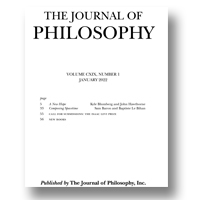|
1.
|
The Journal of Philosophy:
Volume >
120 >
Issue: 5
Linda Eggert
Supererogatory Rescues
abstract |
view |
rights & permissions
| cited by
Recent debates about supererogatory rescues have sought to explain how it can be wrong to perform a suboptimal rescue although it would be permissible not to rescue at all. This paper proposes a new solution to this puzzle. It argues that existing accounts have neglected two critical considerations. First, contrary to what is commonly assumed, a rescue’s supererogatory nature has no bearing on the duties that apply to agents who rescue in supererogatory fashion. Second, we cannot justify harms caused as a side effect of supererogatory rescues by appealing to the fact that it would have been permissible not to rescue at all. Ultimately, the paper proposes, the same duties that apply in cases in which rescuing is required also apply in cases in which rescuing is supererogatory. A rescue’s supererogatory nature, it turns out, is not the game changer we thought it was.
|
|
